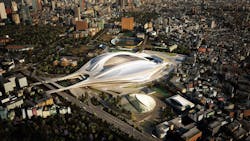Japan scraps Zaha Hadid's Tokyo Olympic Stadium project
By BD+C Staff
Tokyo will have to find a new signature venue for the 2020 Olympics.
ArchDaily reports that Japan, led by Prime Minister Shinzo Abe, announced today that it is ditching its plans to build an 80,000-seat Olympic Stadium in the city. In 2012, Zaha Hadid's architecture firm, Zaha Hadid Architects, won the rights to design the bicycle helmet-shaped stadium.
The rising price tag was one of the downfalls of the 70-meter-tall, 290,000-sm stadium. In 2014, the cost of the project was 163 billion yen, but that rose to 252 billion yen this year—the equivalent of jumping from $1.3 billion to around $2 billion.
The project was riddled with revisions and delays, along with some serious design flaws. Even as recently as a month ago, Japan was still set on continuing with the stadium, citing that any modifications would lead to construction delays.
Critics said the stadium would have encroached on local green space, like the Jingu Outer Gardens, and would have put a financial strain on future generations. Two Pritzker laureates, Toyo Ito and Fumihiko Maki, created a petition that gained nearly 15,000 signatures to stop the construction of the stadium. Alternate proposals included retrofitting existing stadiums from the 1964 Olympics.
Abe said that despite abandoning the design, the stadium would be ready by 2020 for the Olympics and the Paralympics that year, but that it would not be ready for the 2019 Rugby World Cup.
Zaha Hadid Architects released a statement saying that a revamped project would be ready for the 2019 Rugby World Cup along with the Olympics, and that "it is absolutely right that the benefits and costs of the new National Stadium should be clearly and accurately communicated and understood by the public and decision-makers in Japan and we hope that this is one of the objectives of the review announced by the Prime Minister."
